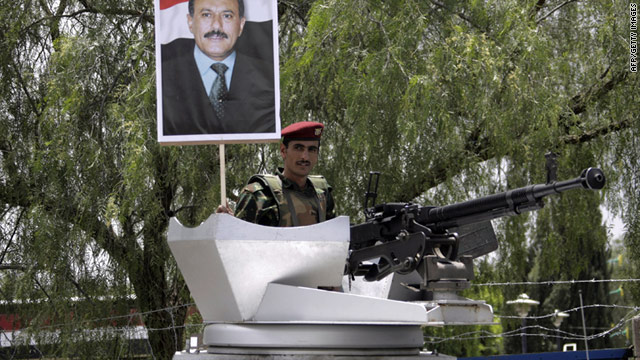September 4, 2011 -- Updated 1701 GMT (0101 HKT)

A Yemeni soldier holds up a picture of President Ali Abdullah Saleh during a rally in support of his regime on September 2, 2011.
STORY HIGHLIGHTS
- Five protesters are reported injured by pro-government gunmen
- Additional troops, tanks are stationed inside the capital city
- The opposition says its differences are working to the government's advantage
Five protesters were wounded Sunday when pro-government gunmen opened fire on them, according to eyewitness accounts and medics in Sanaa's so-called Change Square.
Government tanks and armored vehicles were deployed to main roads in the city. Meanwhile, thousands of vehicles were stranded outside the capital as authorities refused to allow any vehicles inside.
At least 2,000 troops and 15 additional tanks from republican guard and central security forces were in the capital, the official said.
"We have reports that opposition forces will use force and cause violence. The government is on full alert and will not allow chaos in the country," said a senior interior ministry official, who asked not to be named because he is not authorized to talk to the media.
Meanwhile, pro-government armed tribesmen continued to gather on Sanaa's outskirts, waiting to be called to enter the city, according to a large number of eyewitness reports.
The tribesmen told CNN that they are willing to attack opposition leaders and defend the government.
"The protesters are all from the opposition parties -- they are not youth revolutionists," said government supporter Salman Mujalli. "We will enter the capital and force them to go back home."
He said that opposition leaders make life difficult for all Yemenis and are the reason for the political stalemate.
But, said Mohammed Qahtan, spokesman for the opposition Joint Meeting Parties, said opposition parties insist on peaceful change, while the government is pushing Yemenis to arm themselves.
"There are strong efforts for peaceful escalation without entering into a violent phase. Whoever uses violence will only hurt himself," said Qahtan.
However, some in the opposition want to use force to achieve change, said Ahmed Bahri with the opposition Haq party. Such differences within opposition parties works to the advantage of the government, he said; if the opposition were united it could have ousted President Ali Abdullah Saleh's regime before now.
"We believe that force should be used if needed to preserve the revolution," Bahri said. "However, many within the opposition differ with me and want it to be resolved peacefully."
Yemenis are counting on the international community to put more pressure on the government, in much the same way it is doing with the Syrian regime, Qahtan said.
Meanwhile, protesters marched Sunday in most of Yemen's 21 provinces, according to a number of eyewitnesses. The witnesses said the largest protests were in Sanaa, Taiz, Aden and Hodieda, with hundreds of thousands of protesters in each. Some of the protests were the largest seen since the unrest began in January. Protesters claim they have waited long enough and it is time to escalate the situation in peaceful ways.
No comments:
Post a Comment